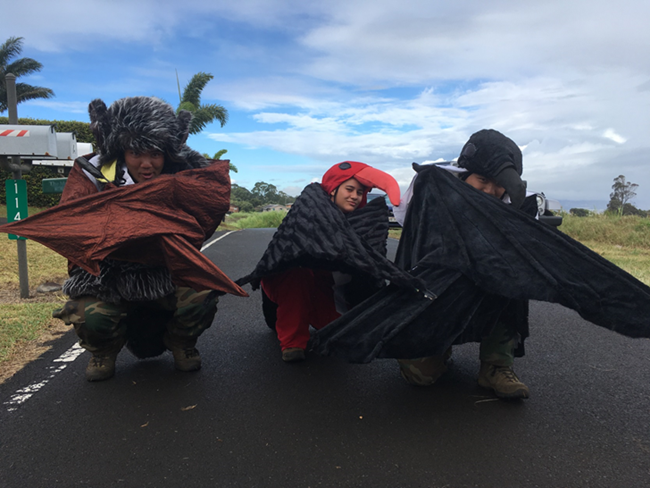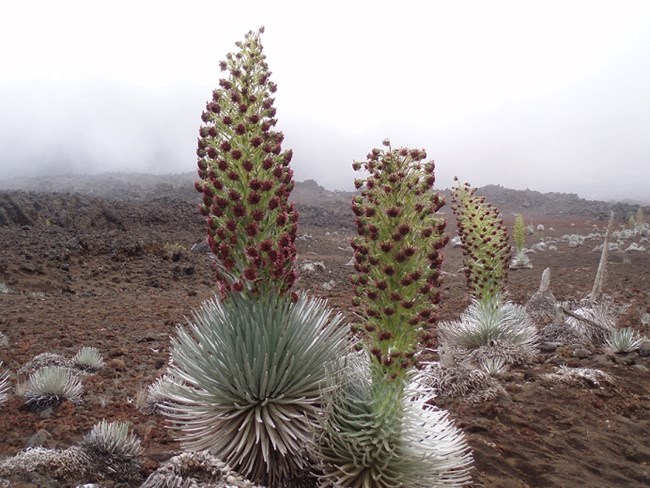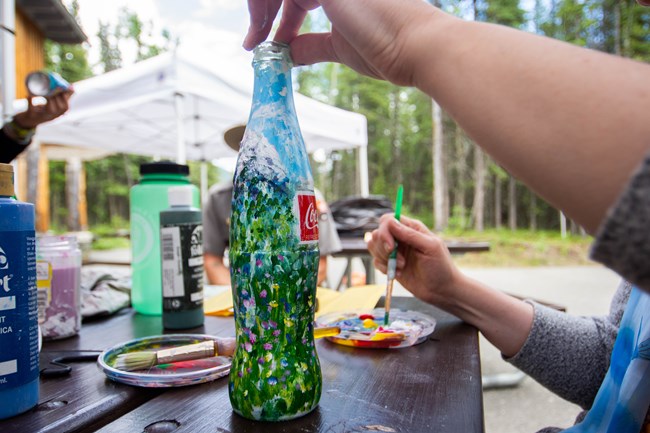
Photo Credit: NASA's Earth Observatory Earth Day Every Day
|
| __Reduce, reuse, recycle __Use only CF or LED light bulbs __Eat/buy local and seasonally produced foods/products __Take a reusable water bottle, lunch containers, and utensils lunches __Use fuel efficient vehicles, avoid idling __Enjoy non-motorized sports __Conserve water, take shorter showers __Turn off lights and electronics when not in use |
__Walk, carpool, ride a bicycle or the bus __Avoid buying “fast fashion”, shop used clothes or hand-me-downs __Grow your own garden __Plan a “staycation” and fly only when you have to __Buy items with less packaging __Volunteer with local conservation organizations or a National Park near you __Learn about local impacts from climate change __Learn about endangered plants and animals in your state |
Your total score:________
Points:
0-9 A Stranger to the Universe
10-29 An Acquaintance
30-49 A Buddy
50-69 A True Pal
70-80 Earth’s Best Friend!
Now, that you have your score, brainstorm how your family can improve. What areas can you work on to make your family more climate friendly? Some areas may be harder to improve on right now, but what areas can you make a small change that will have a big impact? Carrying reusable utensils in your backpack is an example of a simple change that can greatly reduce the amount of plastic waste in your environment. Have fun and be creative!

NPS Photo
Endangered Species Parade (All Ages)
Find an endangered species you think is super cool. Learn a few fun facts about your species and what it looks like. Bonus points for a species found in Hawai‘i, double bonus points for being from Haleakalā!Dress like your endangered species! Hint: colorful clothes, scarves, and old halloween costumes come in handy! To complete the look, craft a hat, beak, and wings. Get creative with your materials, use recycled newspaper, old magazines, empty toilet paper rolls, and anything else you have around your house. Once you are done, have a parade around your house with your 'ohana (family), and try to get everyone to dress up too. Get into your character by moving like your animal. If you are a bird, flap your wings!
Check out the photo of the 'Ōpe'ape'a (Hawaiian Hoary Bat), 'I'iwi (Hawaiian Honeycreeper), 'Ua'u (Hawaiian Petrel) to help inspire you for this activity.

NPS Photo
Earth Explorer Website Hunt (Ages 8 and up)
Climate is an area’s long-term temperature and weather. Climate change is a change in climate patterns, including temperature, rain, and wind. In Haleakalā, the threatened and endemic ‘āhinahina (silversword plant) has adapted to certain rain and temperature conditions. Records show that temperatures in Hawai‘i have gotten hotter and drier in the past 20 years. These changes affect the ‘āhinahina, which may not be able to survive increasing drought conditions.Natural fluctuation of the climate does occur, for example changes in the amount of energy coming from the sun or volcanic activity can impact climate. However, recent climate change caused by human activities primarily burning of fossil fuels (coal, oil, and natural gas) has shown to increase the amount of carbon dioxide (a type of gas) in the atmosphere. Too much carbon dioxide causes the atmosphere to keep in more heat, causing increased temperatures on the earth.
Explore more information about climate change at Haleakalā to answer the questions below:
- How are rainfall patterns in Hawai‘i expected to change?
- Why is this a threat to rare plants?
- What are invasive species?
- How do they impact native species?
- Why does Haleakalā monitor species?
- Why do streams and their quality matter?
- How do mo‘olelo (story) play a role in Hawaiian culture and why are they important?
- How do these mo‘olelo involve mālama ‘āina (stewardship of the land)?
- Which mo‘olelo is your favorite? Why?
- Does your family or culture have any mo‘olelo or something similar?

NPS Photo
Meet the 7- Rs!
(Ages 8 and up)
You know about the 3 - Rs: Reduce, Reuse, and Recycle. Now, learn about their equally important cousins: Rethink, Refuse, Repurpose, and Rot!Reduce - Buy things with less packaging, buy in bulk or buy recycled products.
Reuse - Try to use the item more than once. Many “single use” items like plastic utensils, can actually be used many times.
Recycle - If there is no other way to reuse or repurpose something, try to recycle it so the material can be used again.
Rethink - Take time to think about how you use things. Ask yourself, how you can improve and how you change your habits.
Refuse - Stop the cycle before it starts by refusing the item in the first place. You won’t have to worry about reusing or recycling if you don’t use it in the first place.
Repurpose - If something is broken or used, there may be a way to use it in a different way. Try to fix what is broken or turn it into something completely different! Be creative.
Rot - A great way to deal with food waste is composting. Many cities have composting programs. Or look up how to set one up at home.
Now, that we have met the 7 - Rs, brainstorm how you can practice each of the 7 - Rs in your day. Make a colorful poster to hang up for everyone to see and to remember the 7 - Rs. Draw an example of what you can do next to each R. Consider these questions and have fun exploring the 7 - Rs with your 'ohana (family)!
- Which of these Rs are you doing already?
- Which R do you think is the most important? Why?
- Which R is the hardest for you to do?
- Which R is the easiest for you?
- Why do the 7 - Rs matter?
- Why do the 7- Rs matter to places like Haleakalā? How about to other places you enjoy?
- Can you think of any other Rs? What ways can your 'ohana implement these Rs at home?
More Fun Activites for Earth Day Every Day
iNaturalist video from Hawai'i Volcanoes National ParkClimate Time Machine and Climate Kids from NASA
The National Environmental Education Foundation (NEEF)
Mālama Honua Worldwide Voyage by Polynesian Voyaging Society
Last updated: February 20, 2025

